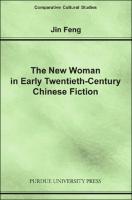New Woman in Early Twentieth-Century Chinese Fiction
| dc.contributor.author | Feng, Jin | |
| dc.date.accessioned | 2023-07-27T13:58:58Z | |
| dc.date.available | 2023-07-27T13:58:58Z | |
| dc.date.issued | 2004 | |
| dc.identifier | ONIX_20230727_9781612498881_46 | |
| dc.identifier | OCN: 62290236 | |
| dc.identifier.uri | https://library.oapen.org/handle/20.500.12657/64155 | |
| dc.description.abstract | In The New Woman in Early Twentieth-Century Chinese Fiction, Jin Feng proposes that representation of the "new woman" in Communist Chinese fiction of the earlier twentieth century was paradoxically one of the ways in which male writers of the era explored, negotiated, and laid claim to their own emerging identity as "modern" intellectuals. Specifically, Feng argues that male writers such as Lu Xun, Yu Dafu, Ba Jin, and Mao Dun created fictional women as mirror images of their own political inadequacy, but that at the same time this was also an egocentric ploy to affirm and highlight the modernity of the male author. This gender-biased attitude was translated into reality when women writers emerged. Whereas unfair, gender-biased criticism all but stifled the creative output of Bing Xin, Fang Yuanjun, and Lu Yin, Ding Ling's dogged attention to narrative strategy allowed her to maintain subjectivity and independence in her writings; that is until all writers were forced to write for the collective. Feng addresses both the general and the specialized audience of fiction in early-twentieth-century Chinese fiction in three ways: for scholars of the May Fourth period, Feng redresses the emphasis on the simplistic, gender-neutral representation of the new women by re-reading selected texts in the light of marginalized discourse and by an analysis of the evolving strategies of narrative deployment; for those working in the area of feminism and literary studies, Feng develops a new method of studying the representation of Chinese women through an interrogation of narrative permutations, ideological discourses, and gender relationships; and for studies of modernity and modernization, the author presents a more complex picture of the relationships of modern Chinese intellectuals to their cultural past and of women writers to a literary tradition dominated by men. | |
| dc.language | English | |
| dc.subject.classification | thema EDItEUR::J Society and Social Sciences::JB Society and culture: general::JBS Social groups, communities and identities::JBSF Gender studies, gender groups | en_US |
| dc.subject.other | literary criticism | |
| dc.subject.other | novels | |
| dc.subject.other | gender | |
| dc.subject.other | gender studies | |
| dc.subject.other | China | |
| dc.subject.other | literary theory | |
| dc.title | New Woman in Early Twentieth-Century Chinese Fiction | |
| dc.type | book | |
| oapen.identifier.doi | 10.5703/1288284317627 | |
| oapen.relation.isPublishedBy | 3600efb5-b3a3-419f-9e4f-7a6094096815 | |
| oapen.relation.isFundedBy | b5941080-3f20-4864-95c6-753acff7c9f4 | |
| oapen.relation.isbn | 9781612498881 | |
| oapen.relation.isbn | 9781612498874 | |
| oapen.relation.isbn | 9781557533302 | |
| oapen.collection | Big Ten Open Books | |
| oapen.place.publication | West Lafayette | |
| oapen.grant.number | [...] | |
| oapen.grant.program | Big Ten Open Books | |
| oapen.grant.project | Big Ten Open Books — Gender and Sexuality Studies Collection |

